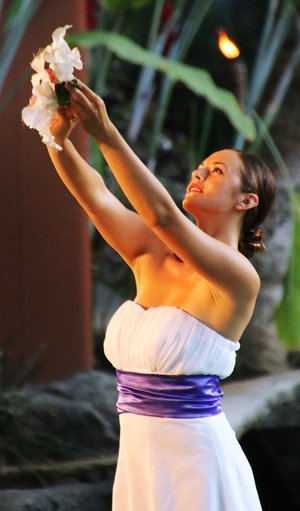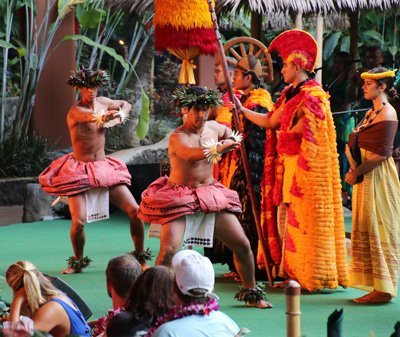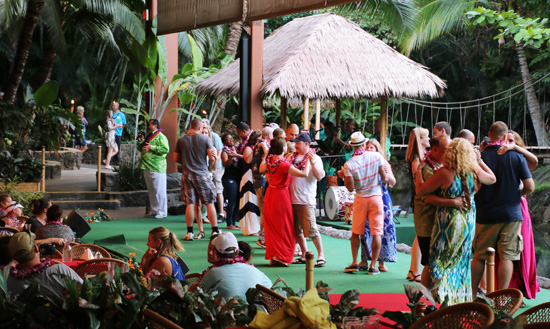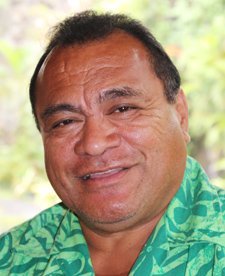Check out our “New” Aliʻi Lūʻau

Lovely Luau Dancer
“It is still the Alii Luau. We haven’t changed the name,” said PCC Islands Director Steve Laulu, who also oversees the luau.
“We want our guests to understand that we continue to honor Hawaii, our host islands — and not just with traditional Hawaiian food:
Starting last January 17, the ali’i or chief began inviting some of the other islands to celebrate during the feast.”
Laulu, who was most recently Samoan Islands manager, explained on the entertainment side the Aliʻi Lūʻau now includes Tahitian, Marquesan and Samoan numbers, “in addition, of course, to Hawaiian.
He said while guests are waiting in line to enter the luau, which still starts at 5 p.m. with a torch-lighting ceremony, performers interact with the guests, showing and explaining the food choices and sharing that Ohana spirit.
“Once they’re seated, we do the mele pule — a song of praise, followed by the imu ceremony, or the uncovering of the pig. That same pig is also served to our guests, along with the kalua-style of pulled pork in the luau buffet. They can watch it coming out of the ground, and then they get to taste it.”

Alii Luau Men Dance for the Royal court
After everyone has had at least one chance to go through the buffet lines, Laulu continued, “we then introduce the Hawaiian royal court, followed by the entertainment.” On a recent afternoon this included Hawaiian hula done in both kahiko or ancient and auana or modern styles.
Laulu makes sure the audience gets to be part of the show, too. In one segment, he invites all those on honeymoon who are in the Alii Luau crowd, and those celebrating wedding anniversaries to come on stage. After determining who’s been married the longest, he then invites the couples to dance —and smooch — to the traditional Hawaiian Wedding Song.
“Of course, we still have our traditional Hawaiian dishes — poke or marinated raw fish, lomilomi [which means ‘massaged’ in Hawaiian] salmon, and poi. Don’t tell anyone,” said Laulu, who is originally from Samoa and joined the PCC team as a student in 1972, “but I really love Hawaiian food.

Guest enjoy a bit of romance while swaying to the sweet sounds of the Hawaiian Wedding Song
Other guests also get a chance to get onstage when Laulu calls for volunteers to try Tahitian dancing, with instruction where needed from the performers.
Turning his attention to luau food, Laulu pointed out there are several delicious new entrées on the menu, including a tasty white fish, braised beef, and baked clam poke — poke means sliced or chopped in Hawaiian

Steve Laulu, Islands Director
After working and studying for two years, Laulu returned to Samoa as a Mormon missionary for two years, then graduated from BYU-Hawaii in 1980 with a degree in business management and worked in the Polynesian entertainment industry until 2007, when he rejoined the PCC team.
Speaking of his Samoan roots, Laulu said the ability to put on feasts and entertaining starts at a very early age. “Our parents taught us to do the right things, especially in hosting. In Samoa whenever anyone’s passing your house, you call out, ‘Hey, come in, have a rest and something to eat.’ That’s how I was raised. As soon as someone would come into the house, we would start preparing food, cook bananas or taro, maybe chase down a chicken. This family thing of sharing is very much alive in our culture.”
“Sometimes we would feed hundreds of people at weddings, funerals, and other events. Samoans find a way to do it. When we have weddings, for example, it’s a big deal. They’re not just our immediate family, but for the whole village, and then other villages because we all have connections.”
Story and pictures by Mike Foley

Mike Foley, who has worked off-and-on
at the Polynesian Cultural Center since
1968, has been a full-time freelance
writer and digital media specialist since
2002, and had a long career in marketing
communications and PR before that. He
learned to speak fluent Samoan as a
Mormon missionary before moving to Laie
in 1967 — still does, and he has traveled
extensively over the years throughout
Polynesia and other Pacific islands. Foley
is mostly retired now, but continues to
contribute to various PCC and other media.

Recent Comments